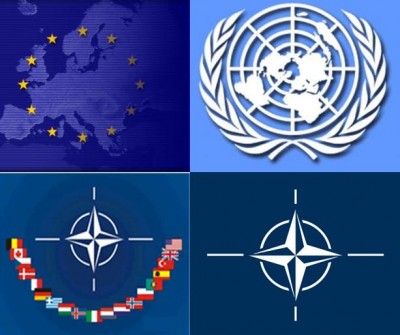The Unspoken Dangers of NATO Enlargement: America Threatens Russia on its Western and Southern Borders

The bill on NATO enlargement that is aimed at speeding up the accession of Bosnia and Herzegovina, Macedonia, Montenegro, and also Georgia to NATO was submitted to the U.S. Congress on Friday, March 9th. Its author is a well-known Republican Senator from the State of Indiana Richard Lugar. The above-mentioned bill says that the USA “continues to support the open door policy for the NATO candidate countries”.
The document that was prepared by Senator Lugar urges U.S. President Barack Obama to present a “clear-cut roadmap on NATO” – meaning the membership of countries that were mentioned at the NATO summit in May this year. This document reflects America’s interests. Asked how much the Balkan states are interested in it, an influential Russian Balkan studies expert, Georgi Engelgardt, says:
“The authorities of Macedonia and Montenegro are seriously interested in the integration of their countries into NATO. And as regards Bosnia and Herzegovina, this is really a very difficult question because opinions on that score differ. The EU High Representative for Bosnia and Herzegovina has always defended the Euro-Atlantic integration. Both the Bosnian Muslims and the Bosnian Croats have also favoured this idea while the Serbs and their political autonomous entity – the Serb Republic – are strongly opposed to Bosnia’s joining NATO. So it is not clear for the time being how Bosnia as a single whole will pass a decision on and take steps toward its integration into NATO.”
According to information available, a separate chapter of the previously mentioned bill is dedicated to the U.S. Nuclear Force in Europe. Among other things, it says that at the upcoming talks “it will be necessary to convince the Russian Federation of the necessity to strengthen transparency in the issues dealing with non-strategic nuclear weapons in Europe and to withdraw all these weapons from the borders of the territories of NATO member-states.” The Russian Balkan studies expert Georgi Engelgardt has certain doubts on that matter.
“Of course, of great importance for the USA here would be the support by all countries of the NATO enlargement policy or the development of anti-missile defence. It would also be good for all governments to come in defence of this project at international and European forums. And in case of need they should offer their territories for basing missile defence elements there. As it appears, the governments of Macedonia and Montenegro will be ready to do that. . However, as regards Bosnia and Herzegovina, if the Muslims and the Croats favour this too, the Serbs, despite the fact that the Bosnian Serbs were also subjected to the NATO bombing 18 years ago, will disapprove granting the above-mentioned territories for military facilities. As a result, many questions will arise.”
However, the biggest question is this: is it accidental that the bill on NATO enlargement has been submitted for consideration shortly before the next anniversary of NATO’s aggression against former Yugoslavia? There’s reason to believe that this question will remain unanswered. Well, when it comes to big money, uncomfortable questions are ignored.

